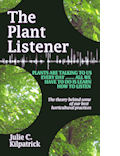Growing Garlic
Used as a flavouring for a wide range of foods, garlic is an essential addition to any herb garden but if you are a lover of garlic, it's best grown in the vegetable plot.
Garlic requires a long growing season. I prefer to plant it in November so my bulbs get the chilling period they need. For garlic to split properly into cloves, it needs around 30 days at below 10 degrees centigrade. If you're too late, you can still plant in spring but you might not get your bulbs to split. What you'll probably get is one big garlic clove, which you can still use, but it'll taste milder and still store relatively well. Either way, buy bulbs from a garden centre or seed company rather than use the garlic you buy in the supermarket as you'll get much better results and the varieties you get will be more suitable for growing in your own climate.

Like all bulbs, you need to make sure the soil is free draining as waterlogging will cause the bulbs to rot. Plant individual cloves of garlic in a sunny spot in soil that has been enriched with a good amount of organic matter - home-made garden compost will do.
Harvest garlic just as you would onions when the leaves start to turn yellow. Leave them to dry out in the sun if you can so they form a nice papery sheath. Simply tie or plait them like onions and hang indoors in a dry airy place until you are ready to use them.
In the kitchen, the uses of garlic need no explanation - use garlic in virtually any dish. To stop your breath smelling, remove the inner core of the garlic clove and then crush the garlic to release its flavour before chopping.
The health benefits of eating garlic are fairly well known. It is said to guard against cancer and heart disease, reduce cholesterol, act as a blood purifier and help you cope with colds and flus. All these benefits, of course, are even better when you grow it yourself organically.
As a companion plant, garlic is used as a general insect repellant and can be planted next to most fruits and vegetables. Garlic spray will fend of aphids but be aware, it might also kill off any beneficial insects so use it with caution. Like most members of the onion family, garlic has antibiotic and anti-fungal qualities so is often planted near plants which are susceptible to fungal infections. Because of its antibacterial qualities, avoid planting garlic near any member of the legume family (peas, beans, etc.). These plants form close relationships with friendly bacteria and garlic might interrupt this.
Julie is a lecturer in horticulture, editor of Gardenzine and author of The Plant Listener
Garlic cloves image by Ronaldo Taveira




